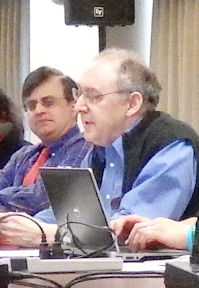


First off I'd like to thank the NIH and the Sleep Disorders Research Advisory Board for inviting Susan Plawsky and giving her the opportunity to raise awareness of our Circadian Sleep Disorders issues. Susan suffers from Delayed Sleep Phase Disorder, and is a former board member of Circadian Sleep Disorders Network, and I want to thank her for the time and effort she is putting into this.
The big news from Circadian Sleep Disorders Network is that we are starting a patient-powered registry, partnering with Patient Crossroads. We hope this will provide some useful data to researchers, as well as access to patients with these disorders who may be willing to participate in further research. We are currently developing the questions to be used in the initial survey. If any of you would like input into those questions, please contact me at peter@csd-hyphen-n.org ("don't forget the hyphen, or you'll get the Chinese Software Development Network.").
We're still busy raising awareness of these disorders, among the medical community as well as the public. But a weak link in our efforts is that the sleep pages on the NIH website STILL do not include Circadian Rhythm Sleep Disorders. This is the fourth year I've been coming here and raising this issue. Lay people look to NIH for authoritative information, and they look up Delayed Sleep Phase Disorder or Non-24-Hour Sleep-Wake Disorder and don't find it on the NIH website. That supports their belief that we're just making up these disorders and that we don't have to be taken seriously. NIH, it's time, please fix this.
I'd also like to touch on what I believe is an often overlooked point in the research. Delayed Sleep Phase Disorder (for example) is a symptom, not a single disorder. There are lots of people who are "evening types", and many of them have a longer than average intrinsic circadian rhythm. But most of them can entrain to relatively normal sleep hours and can manage their daytime jobs. Why can't we? (This is what normal sleepers find so hard to understand: even if we push ourselves and get extremely tired, we just don't fall asleep at the desired time.)
So why can't we entrain? There is some entrainment mechanism that is not working correctly.
Perhaps some of us don't respond strongly to light. For those, bright light in the morning may help. Perhaps some are oversensitive to light, and restricting light in the evening may help. Perhaps some do not secrete enough melatonin, and supplements may help. Perhaps others do not eliminate melatonin rapidly enough. But the studies of treatment efficacy apply the same treatment to everyone presenting with "DSPD". It is no surprise that treatments do not seem effective. You would get similarly low efficacy if you treated every fever with an antibiotic that only targets strep infections.
So we need to sort out the different causes of the DSPD symptoms, and tailor the treatment to the cause. And we need efficient means of detecting the cause.
And so, by the way, treatment statistics developed on shift work people who are otherwise normal sleepers are not applicable to us.
Let me close with this thought: You wouldn't tell a blind person "My eyes can see, therefore your eyes must be able to see." So please don't tell us "My eyes can entrain, so your eyes must be able to entrain also."
Thank you.
---------
1 - National Institutes of Health (U.S.)